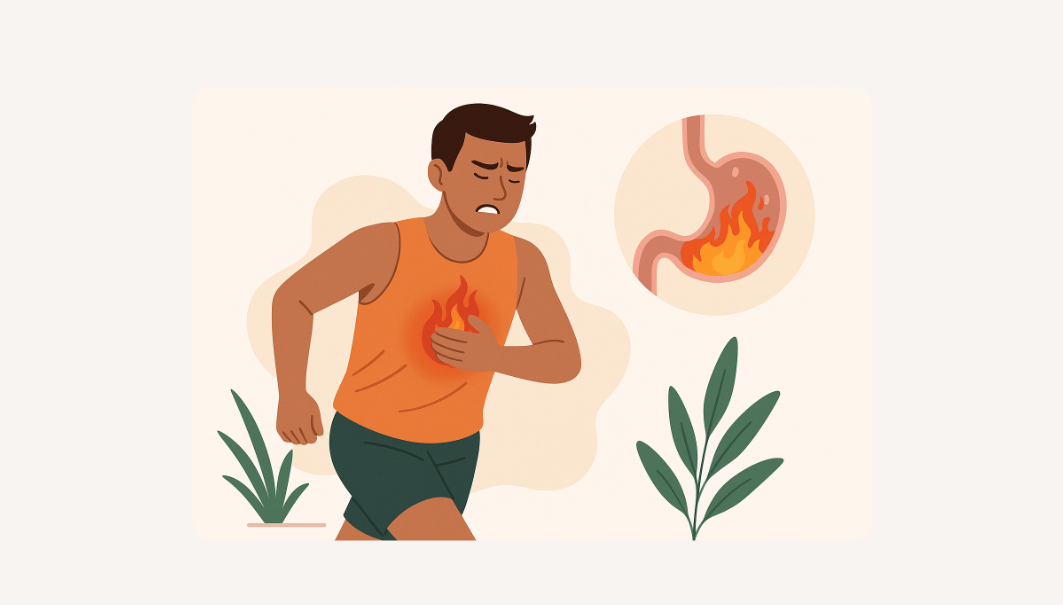
Acid Reflux in Athletes: Hydration and Timing Fixes
|
|
Time to read 4 min
|
|
Time to read 4 min
Acid Reflux is a common digestive issue that causes discomfort to many athletes.
While it affects millions of people worldwide, many are still unsure about what causes it and how to treat it effectively.
This blog includes what acid reflux really is, what its symptoms are, why do athletes get acid reflux, and simple hydration and meal time fixes to help you manage it effectively.
Already tired of scrolling through blogs and wondering what might work for you?
Don't worry, Claisen got you covered!
Acid reflux occurs when stomach acid flows back into the esophagus, causing a burning sensation in the chest.
During intense workouts, especially running or high-impact sports, increased intra-abdominal pressure and movement in the body can weaken the lower esophageal sphincter (the muscle that keeps the acid from reaching the esophagus).
This allows acid to escape upward, leading to exercise-induced reflux.
Let Claisen take the guesswork out of your routine with personalized solutions designed to target your problem at its root, so you can feel better, faster.
During vigorous exercise, the body puts extra pressure on the stomach. This pressure can cause stomach acid to move upward into the esophagus, leading to reflux.
Exercises that involve bending, crunching, or heavy lifting squeeze the abdomen, which increases the chances of acid reaching the esophagus.
When athletes don’t drink enough water, the stomach lining and esophagus may become more sensitive, making acid reflux worse.
Energy drinks, sports drinks, and coffee are common among athletes but are also acidic or contain caffeine, which relaxes the muscle (LES) that normally keeps acid in the stomach.
Consuming large amount of water or food right before exercise.
High-fat or spicy pre-workout meals take longer to digest
Vigorous activity increases pressure on the stomach
Dehydration concentrates stomach acid
Staying properly hydrated can help with heartburn. Drinking enough water dilutes stomach acid, making acid reflux episodes less prevalent.
It also keeps the esophagus healthy, helping the muscle at the bottom (the sphincter) close better.
Whereas dehydration makes the acid stronger and slows down stomach emptying, which can worsen heartburn.
Eat a balanced, low-fat meal 2 to 3 hours before training
If you need a pre-workout snack within 60 minutes of activity, take easily digestible carbs like banana.
Keep fats and proteins less to speed gastric emptying
Drink 2 cups of water 30 minutes before you start
Struggling with Constipation, Heartburn or Bloating? Checkout our other blogs too!
Oatmeal, quinoa, and whole-grain toast provide fiber without triggering acid reflux symptoms.
Leafy greens, cucumbers, and sweet potatoes offer vitamins with low acidity.
Non-fat dairy or plant-based milk neutralizes acid and lends protein
Ginger and chamomile tea can calm the digestive tract
Staying well-hydrated helps dilute stomach acid and helps with acid reflux symptoms.
Eat a low-fat, balanced meal 2 to 3 hours before exercise.
Skip the guesswork with people who claim they have a "solution". Get a personalized relief plan that stops the cause of your pregnancy constipation.
Claisen is a 100% online platform designed to provide personalized relief for bloating, gas, and heartburn: perfect for expecting moms looking for safe and effective options.
With Claisen, you can skip the guesswork and get instant relief.
This article and its contents have been medically reviewed by Aditya Jain (MD at Harvard Medical School and Op-Ed Fellow at Doximity).
Yes. High-impact or core-intensive workouts can increase abdominal pressure, pushing stomach acid into the esophagus. hence, causing acid reflux.
Low-fat, low-acid options like oatmeal, bananas, sweet potatoes, or whole-grain toast help with acid reflux.
Water, coconut water, and low-sugar electrolyte drinks are best for acid reflux.
Yes. Dehydration can reduce saliva production, making acid reflux symptoms worse.




